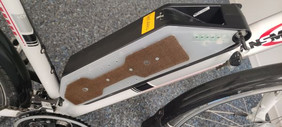In the project BioBattery, the Fraunhofer Institute for Structural Durability and System Reliability (Fraunhofer LBF) and Ansmann AG, a leading German producer of lithium-ion batteries, developed organic sheets containing flax fibres. The sheets were used to reinforce battery casings for e-bikes.
Organic sheets are fibre-reinforced thermoplastics, which are lighter than their metal counterparts and comparatively strong for the given application.
Fraunhofer LBF developed and adapted the production process in such way that it will be easier to step up for the serial industrial manufacturing. Due to its mechanical properties and its low weight, the developed compound will mainly be used for lightweight applications with several demands.
Organic sheets containing natural fibres are not commercially available in the market today. Natural fibres are sensitive and can get damaged at high temperatures during processing, which occur during impregnation of the fibres with the thermoplastic matrix. On the other hand, fibres from hemp and flax are less likely to split and they are highly elastic. These characteristics promise for the creation of materials with higher impact strength. They could improve safety in case of a crash and reduce risks of breaking battery cases in electric vehicles.
In the project BioBattery, the process of melt impregnation was developed by Fraunhofer LBF to produce organic sheets containing natural fibres. In this case, the Fraunhofer-Team used flax fibres, which are less sensitive to heat than other natural fibres. Polypropylen (PP) was used as material for the matrix. Additionally, the scientists tested bio-based PA11[1] as a matrix, too, as it has superior mechanical properties. Due to its characteristics, PA11 could be even more promising as a matrix material than PP in the long term.
E-bike battery housing from Ansmann was used to demonstrate the flax-PP organic sheets as reinforcement for the housing. During tests, they proved to be superior to comparable solutions on the market in terms of their mechanical properties and regarding the light-weight option.
The organic sheets have been integrated in the injection molding process of battery housing using back injection moulding. A slight undesired bent appeared after cooling the housing. The scientists assume that this is due to difference between the thermal expansion coefficient of the organic sheet and the PP-matrix. Their aim is to find a solution to prevent bending of the housing. If the optimisation of the process will be successful, industrial scale use of natural fibre based organic sheets is possible in near future.
The German Federal Ministry for Food and Agriculture (BMEL) funded the project BioBattery (Großserien-Leichtbau mit naturfaserverstärkten biobasierten Kunststoffen am Beispiel Lithium-Ionen-Batterie-Gehäuse) via the Fachagentur Nachwachsende Rohstoffe e.V. (FNR). Further Information and the final report (in German) are available on https://www.fnr.de/projektfoerderung/projektdatenbank-der-fnr/ searching for the FKZ 22010018 and 2219NR064.
Contact:
Fachagentur Nachwachsende Rohstoffe e.V.
Robert Hardt
Phone.: +49 3843 6930-204
Mail: r.hardt@fnr.de
Press contact:
Fachagentur Nachwachsende Rohstoffe e.V.
Nicole Paul
Phone.: +49 3843 6930-142
Mail: n.paul@fnr.de

